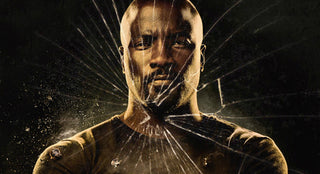I know you’re probably looking at this title and saying: “Oh man, here goes Justin with another Anti-Marvel crusade.” And before you hit the back button, and complain about it to me on Twitter (before you get blocked), hear me out—I really do love Marvel and Netflix’s Television division to an extent. I think the episodic nature of the shows are something that characters like Daredevil and Jessica Jones needed—street-level, highly personal stories that can go deeper than the big budget movies can provide. Arguments about the length of these seasons (built for binging, not built for your sanity) notwithstanding, they are an addendum to the movies without being overly heavy-handed in their inclusion—and not wholly disconnected from the extended universe altogether like DC.

Image via Netflix
It’s also a great way to introduce characters that Marvel Studios couldn’t be pressed to drop $150 million dollars on in the middle of the summer—allowing characters like Luke Cage to have the tender loving care needed to make a underrated hero a bonafide superstar. In Marvel’s case, it’s a win-win. Introduce an African-American superhero just months after pushing another one to the Moon (Black Panther, you may have seen him for like 15 minutes total in Captain America: Civil War) months earlier to spark the idea of diversity in a genre that sorely needs it.
Luke Cage was the coming out party for a secondary, maybe tertiary, character in Jessica Jones—riding the wave of a well-received trailer that had (gasp!) rap music in it. It has a literal X-Men-esque line up of people working on it too: Former music journalist and TV writer Cheo Hodari Coker as the showrunner. Adrian Younge and freaking Ali Shaheed Muhammad as the composers. Powerhouse actors like Alfre Woodard, Mahershali Ali, and Simone Missick rounding out the cast around Mike Colter’s starring role as Luke Cage. This wasn’t a mistake, and it isn’t a coincidence that Marvel is doing the same by putting their chips on Ryan Coogler with Black Panther on the big screen. Luke Cage is a show that is stacked this way to inspire faith that Marvel can succeed at doing Black characters, and not have it come off as corny. Luke Cage mostly succeeds… in the wrong ways.
Off the bat—the show feels like it was written with a hip Dad’s touch. In trying to be inclusive of Black culture, it almost exclusively cuts itself off at around the early 2000s, maybe after Jay Z’s The Blueprint came out. Luke Cage seems like he goes to sleep at 10:30 p.m., only listens to oldies stations, and will tell you to pull your pants up because your boxers are showing. It’s an antiquated view of what the “streets” are that I’m sure was intentional, but is utterly safe—it’s confusing why they would go this way.
I had originally called the show safe when I saw the trailer—yeah, it has rap in it, but it’s rap music that wasn’t really a deep cut. It was fucking “Shimmy Shimmy Ya,” which is the most “let’s not piss the white people off TOO much” choice you could pick. That goes two-fold for the on-the-nose naming of the episode titles, the heavy-handed (but admittedly well done) musical interludes—just try and count how many times Raphael Saadiq is mentioned before you check to see if your father is ADR’ing the lines on the show. Luke Cage the show feels dipped in a ’70s blaxploitation filter, one that dates the show before Episode 2 even starts. Luke’s “code” if you will, is hardcoded. Don’t call him the “N” word, you noisy kids. Harlem was so much better when those darn thugs didn’t rob, shoot, steal, and listen to Lil Uzi Vert.

Image via Netflix
My eyes almost rolled out of my head when I found out that Luke Cage actor Mike Colter revealed that he wore a hoodie in the show as a tribute to Trayvon Martin. There couldn’t be a less obtuse allusion to this? How about mentioning explicitly that this event happened in Marvel’s world, too? Would that be too “in your face” for the people who want to forget it? This is yet another example of Luke Cage checking all of the “Black people like stuff like this” boxes, and it comes off as pandering. I find the near-unanimous love for Luke Cage from some of my peers utterly confusing—this show is almost explicitly written to connect with us in a completely obvious, manipulative way. Doesn’t that take you out of it?
To be fair, Luke Cage didn’t have to do anything except not make the Black characters on this show into stereotypes. Problem is, they are aggressively “NOT STEREOTYPES” that they become more boring versions of characters from Shaft or Dolemite. As the show plods from episode to episode, following the same Marvel Netflix formula not nearly going into second gear before stalling midway to pad out the show to 13 episodes—I grew increasingly sure that this probably wasn’t the way to do this show. Luke Cage is just boring, as a character. Attaching him to such a heavy code of ethics, that the show does not hesitate to repeat to you, makes him unable to act in a realistic way. Daredevil comes to terms that he isn’t a good person, or lover in his show. Jessica Jones finds the will to fight back against her abuser, and to trust people. Luke Cage is Black, he’s a hero. But in trying to not piss anyone off, he isn’t a character. And that makes this show a huge waste of time for me. Okay, now you can go complain.

